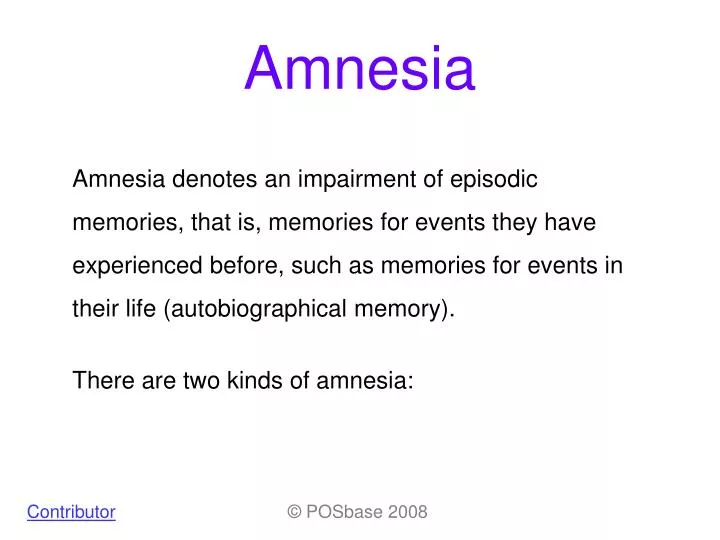
In addition, priming (both perceptual and conceptual) can assist amnesiacs in the learning of fresh non-declarative knowledge. People can learn new procedural knowledge. However, a severe reduction in the ability to learn new material and retrieve old information can be observed.


In people with amnesia, the ability to recall immediate information is still retained, and they may still be able to form new memories. Scientists were able to find that mice with damaged memory have a lower level of RbAp48 protein compared to normal, healthy mice. Recent studies have shown a correlation between deficiency of RbAp48 protein and memory loss. Research has also shown that when areas of the diencephalon are damaged, amnesia can occur. In addition, specific areas of the hippocampus (the CA1 region) are involved with memory. ▼ AmnesiaĬase studies also show that amnesia is typically associated with damage to the medial temporal lobe. How is amnesia treated?Quick facts: Amnesia, Other names, Specialty. Confusion, memory loss, and alerted alertness. The impact of anesthetics drugs on memory and memory modulation under general anesthesia. Transient global amnesia: current perspectives. Post-traumatic amnesia and confusional state: hazards of retrospective assessment. Psychological causes of autobiographical amnesia: a study of 28 cases. The nature of anterograde and retrograde memory impairment after damage to the medial temporal lobe. Smith CN, Frascino JC, Hopkins RO, Squire LR. The results can help to identify a brain infection. Lumbar puncture: Also called a spinal tap, examines the cerebrospinal fluid surrounding your brain and spinal cord.Imaging tests: Magnetic resonance imaging (MRI) and computed tomography (CT) scans can help your healthcare provider identify problems like brain bleeding, brain tumors, inflammation, and brain damage.Electroencephalogram (EEG): Detects abnormal brain function by monitoring your brain's electrical activity and identifying seizures.Laboratory tests: Blood tests like a complete blood count (CBC) can identify signs of blood chemistry abnormalities, such as vitamin deficiencies and drug abuse that may cause amnesia.You may take one or more tests based on your symptoms. Cognitive exam: Can include tests of logic, reasoning, judgment, and short- and long-term memory.Medical history: Your healthcare provider will ask questions regarding your medical history, the nature of your memory loss, when it began, and whether other symptoms have accompanied your symptoms of amnesia.Physical exam: Includes a neurological function test, including an assessment of reflexes, strength, balance, vision, hearing, gait (walking), motor strength, and control.It is usually temporary, though the incidents that occurred during the period that the drug affected you may be difficult or impossible to recall. Drug-induced amnesia: Can occur as a result of taking certain drugs during prescribed treatment, general anesthesia, or substance abuse.Physical symptoms like headaches, nausea, or dizziness may accompany these episodes. During that time, you are unable to make new memories, but you usually retain your memory of your identity, the identity of family members, and your ability to perform daily tasks. It is a temporary condition that usually lasts between one and 10 hours. Transient global amnesia: Occurs as a sudden and brief loss of memory, often in middle-aged or elderly people.

It can cause you to feel disoriented and have notable confusion regarding who you are, where you are, and what happened to cause your brain injury. Post-traumatic amnesia: Memory loss that occurs after a brain injury, such as a stroke, head trauma, or coma.It usually follows a period of severe trauma or psychological stress. It causes retrograde amnesia related to autobiographical memory. Dissociative amnesia: A rare dissociative disorder in which you are unable to remember key elements of your identity and life.


 0 kommentar(er)
0 kommentar(er)
